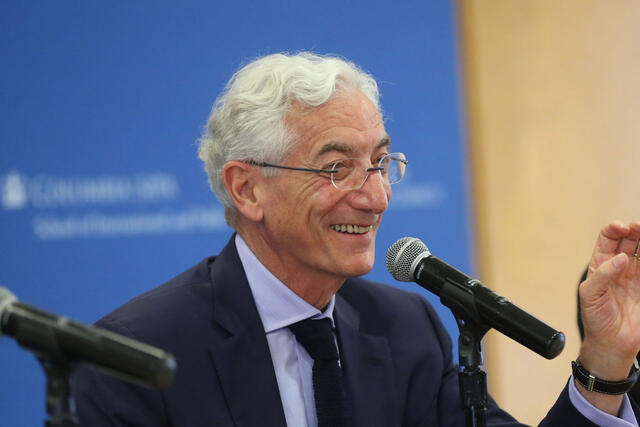
The Global Impact Revolution: A Conversation with Sir Ronald Cohen

Impact investing means investing in companies, organizations, and funds with the intention to generate a measurable, beneficial social or environmental impact in addition to financial return.
It’s also the future of capitalism, said Sir Ronald Cohen in a May 1 visit to SIPA.
An Egypt-born refugee who was forced to flee to the UK at age 11, Cohen is a pioneering philanthropist, venture capitalist, private equity investor, and social innovator. He serves as chairman of the Global Steering Group for Impact Investment and co-founded Social Finance UK, USA, and Israel. He’s also a co-founder Chair of Bridges Fund Management and Big Society Capital, and chaired the G8 Social Impact Investment Taskforce.
Cohen had visited to discuss the “Global Impact Revolution” with Professor Takatoshi Ito, who has taught a course on impact investing. Sustainable Columbia hosted the event; Dean Merit E. Janow of SIPA moderated.
Cohen said he became interested in impact investing when he started looking at poverty in the UK. Philanthropy and government spending were just not enough to solve the problem, he added, which led to an interesting question:
“How do we go beyond government spending and philanthropy?” Cohen asked. “How do we manage to tie investment to social issues?”
In 2002 he published a paper arguing for a new type of investment bank focused on social finance. By 2010, Cohen and his group had invented the social impact bond. Then Cohen began to work internationally with the G8 and realized something momentous; the world was changing.
“It was changing,” he said, “because there is a generation of young people that wants more meaning in life than just making money. They would like to improve other people’s lives and the planet.”
Older people with pensions and investments were also starting to spend n social and environmental goals.
“The world was moving towards optimizing risk, return and, now, impact,” said Cohen. “Take coal companies. They’ve taken a financial hit after it became clear that they were having a negative effect on the environment.”
Being socially and environmentally conscious is now a risk-mitigation strategy for companies.
Cohen pointed to another example. In poorer areas of England—a country whose residents are plagued by health and weight problems—his company Bridge Solutions created a chain of low-cost gyms. Lacking spas and even changing rooms, but open every day, the gyms grew faster than mainstream versions. Suddenly, other chains were clamoring to buy the brand.
“Capitalism is changing – that’s what it’s going to change to,” said Cohen.
Asked about gauging impact, Cohen suggested looking to how we measure other types of data, like carbon credits or employment information. He said big data will likely play a role but was reluctant to predict for sure how it will be done.
Ito said he had been skeptical about social-impact bonds at first, but learned a lot through teaching his impact investing course.
“I’m now half converted,” he said.
Ito continued: “There are ways the private sector can either replace the government or better work with the government to find solutions. How to apply those solutions in the framework of a public-sector project… I think that’s the interesting viable way of thinking about the problem,” he said.
— Claire Teitelman MPA ’19